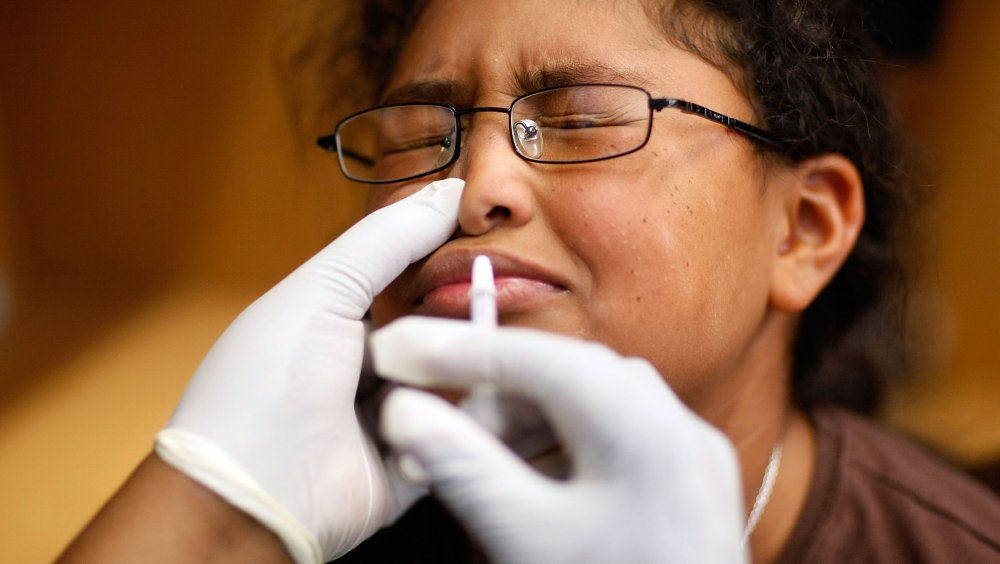Does The Flu Shot Give You The Flu?
An annual flu vaccine is the best way to reduce your chances of contracting influenza and spreading it to others, according to the Centers for Disease Control and Prevention. Yet some people remain nervous about getting the flu shot. In fact, The Cleveland Clinical Journal of Medicine notes that only 45 percent of adults nationwide and 63 percent of children were vaccinated during the 2018 to 2019 influenza season, citing reasons such as, "I got the flu shot, and I still got sick."
Does the flu shot give you the flu? No, physicians say — but you can experience some side effects, including achiness and a low-grade fever, or a fever lower than 101 degrees Fahrenheit (via Insider). You also might feel sore at the injection site or notice redness or swelling there.
Some people can mistake side effects from the flu vaccine for the infection, but these side effects actually are proof that your immune system is responding appropriately to the vaccine, says Ian Nelligan, a family medicine physician at Stanford Health Care in Palo Alto, California. "Side effects of the flu vaccine are much more mild than the symptoms of an influenza infection," he explained.
Symptoms after a flu shot are your immune system in action
From October 2019 through early April 2020, the CDC estimates that influenza — the viral infection of the respiratory system that people commonly call the flu — was associated with 38 million illnesses; 405,000 hospitalizations; and 22,000 deaths (via CDC).
As an injection, the flu vaccine is manufactured from proteins of the influenza virus or the "killed" virus, not the live virus itself, doctors say. "You cannot get the flu from the flu vaccine if you get it as a shot," Neena Xavier, M.D., an assistant professor at the University of Alabama at Birmingham told Insider.
The symptoms or side effects that you experience are the results of your immune system producing antibodies to combat the flu, Xavier says. "The virus is not causing it — your body's fight mechanism is," she noted.
You might still get the flu even after getting the vaccine, however. That's because the vaccine itself is not 100 percent effective. The CDC explains that scientists try to match the viruses in the vaccine with those that have been circulating before the upcoming flu season, but they don't always match that perfectly (via Insider).
You can't get the flu from the flu shot — but you can get it too early
If you get the shot too early in the year, such as July or August, you also won't have the best protection against the flu and could catch it anyway, physicians say. That's why the CDC recommends adults get their annual vaccine by the end of October.
Flu vaccines in nasal form do contain live viruses, but they're designed to be too weak to infect someone with a normal immune system. Nevertheless, the CDC recommends that people with weakened immune systems, pregnant women, and adults ages 50 and old avoid the nasal spray vaccine (via CDC).
In rare cases, people who receive the flu vaccine can exhibit a high fever (above 101 degrees Fahrenheit) or a neurological disorder called Guillain-Barré syndrome, which affects the nerves outside the brain and spinal cord, causing weakness in the legs. The CDC says that fewer than two cases per every million people vaccinated against the flu get Guillain-Barré syndrome (via CDC).
Some people also can experience severe allergic reactions within minutes or hours of a flu vaccine, including difficulty breathing and a tightening sensation in the throat, Xavier told Insider. Talk to your doctor right away if you notice these symptoms.



